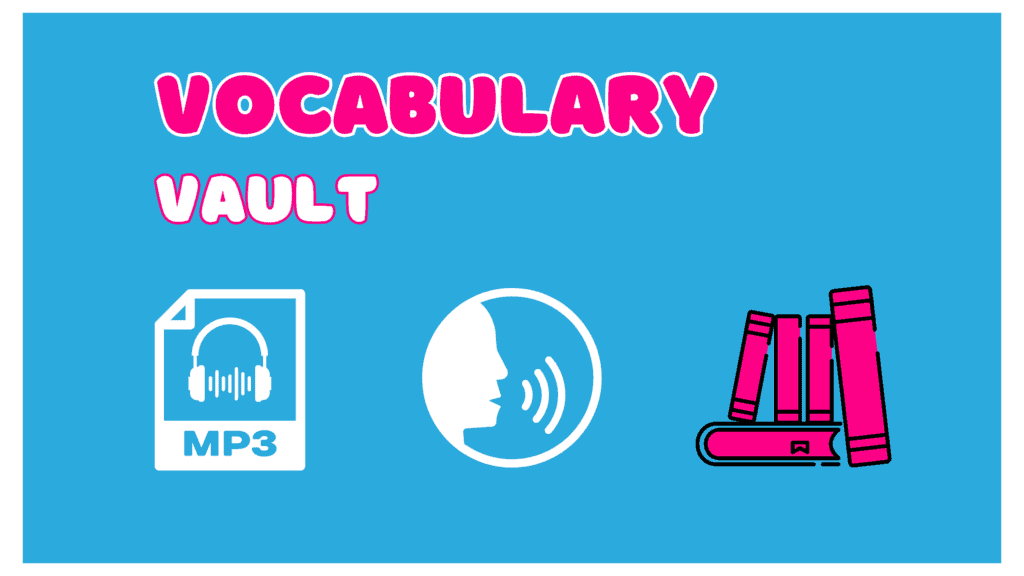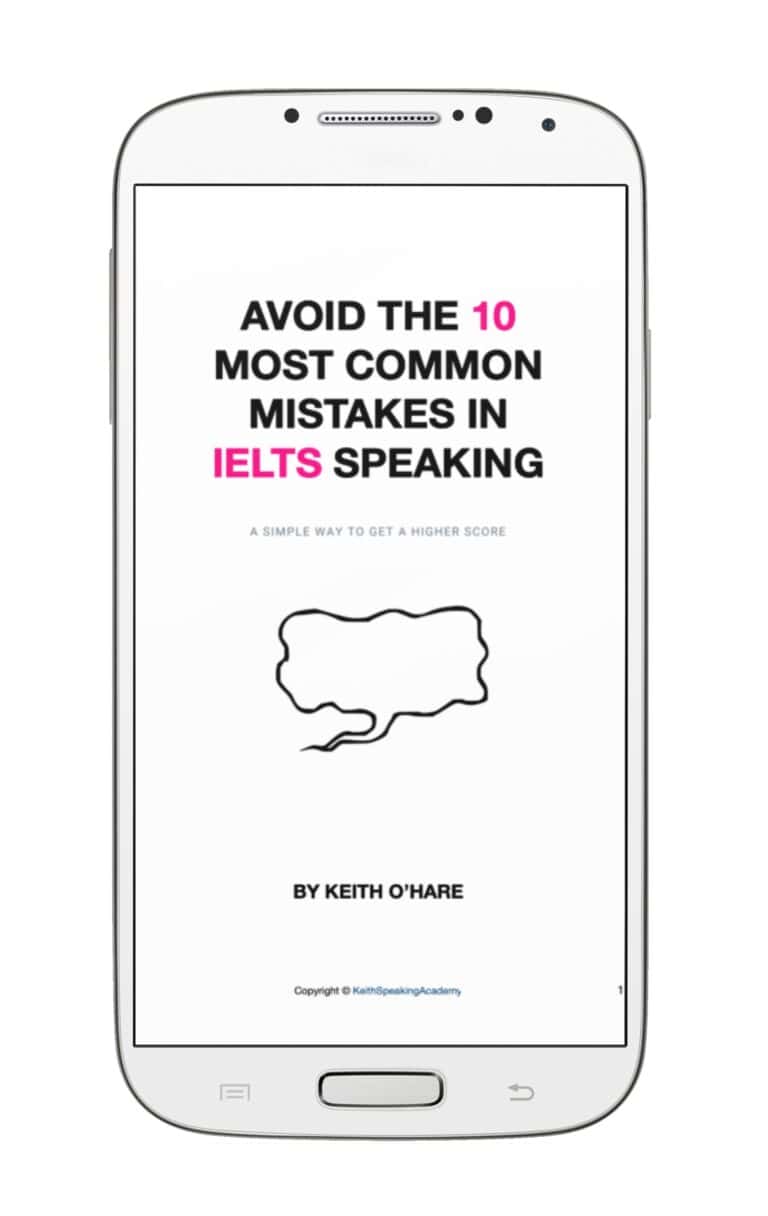IELTS Speaking Lesson about Daily Routines
👇 Take this lesson with you! 👇
Table of Contents
IELTS Speaking vocabulary: Daily routines
Warm up!
Fill in the gap with one word
- I have a steady routine in the mornings, I ___ get up at 7am and then have a shower
- I am busy at work, but I like to study Chinese every now and _____
See answers
- I have a steady routine in the mornings, I usually / always / will / often / inevitably / mostly get up at 7am and then have a shower
- I am busy at work, but I like to study Chinese every now and then / again
IELTS Speaking: Daily routines
Ways of expressing habits and routines
- I get up early everyday
- I will get up early (present habit)
- I always get up early
- I tend to get up early
- I typically get up early
- More often than not I get up early
My schedule/routine goes something like this…
- I always / usually / often / sometimes get up early
Other ways of expressing these Adverbs of Frequency
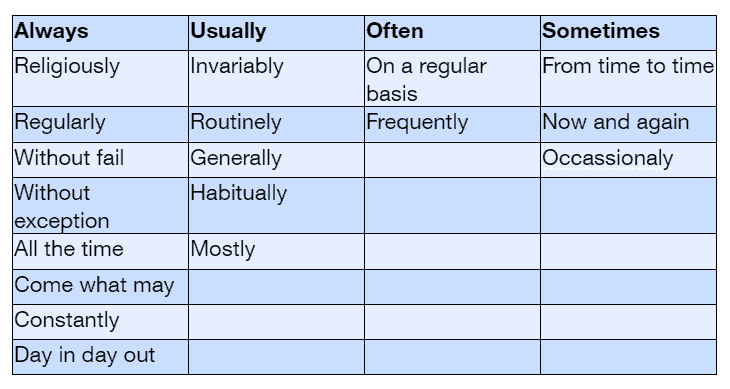
TIP: If the adverb of frequency is long it usually goes at the beginning or end of a phrase, not in the middle!
I get up at 7am on a regular basis
From time to time I get up at 9 am
I go to work every Monday without fail
Common morning routines
Here are some useful phrases to describe common morning routines people have.
Note: Phrases in pink are more colloquial (informal)
- To sleep in = to stay in bed a longer time
Note: This is different from ‘to oversleep’ = to stay in bed a longer time by mistake
- To get up
- To crawl out of bed = get out of bed slowly and with difficulty
- To have breakfast
- To have a big/hearty breakfast
Note we use ‘a’ if you add an adjective
- To grab breakfast = take it quickly
I grab a coffee
I get myself a coffee
To brush my teeth
To have a shower
To go to the gym
I go down the gym
I hit the gym
I work out
Homemakers
I prepare the kids for school
I get the kids ready for school
I sort the kids out for school
- I do the school run = to take the kids to school
Instead of saying ‘I cook’ in spoken English, we often use the form ‘I do the ____’, especially when talking about chores and household tasks.
I do the cooking
I do the cleaning
I do the washing (clothes
I do the pots/dishes (=wash the dishes)
For more household routines, check this post and video – https://keithspeakingacademy.com/how-to-talk-about-housework-in-ielts-speaking/
Workers
- I commute to work = to travel to work, some distance
I check my emails
I waste time scrolling on TikTok
Students
- I hit the books every evening (=to study)
I go down the library
I hit the library

Are routines good or bad? Why?
Here are some phrases you can use to say what routines maybe good, bad or both!
Good
- Build productive habits
- Give a sense of productivity
- Give me a sense of progress
- Can lead to good studying results
- Perfection comes through repetition
- They help us stay disciplined and stay on track
Find out the benefits of routines here
Bad
- They make out lives boring and monotonous
- They are absolutely, mind numbingly mundane
- I feel I am stuck in a rut
- They can cause anxiety
- They could lead to depression
- Our lives end up lacking freshness
For whom?
Old People
- Give a sense of certainty
- Can reduce stress
Kids
- Give a sense of safety
- Establish clear boundaries
- Make you more productive
- Easy for managers to organise and control staff
New free IELTS speaking course!
Improve your Part 1 answers with my new, short online course
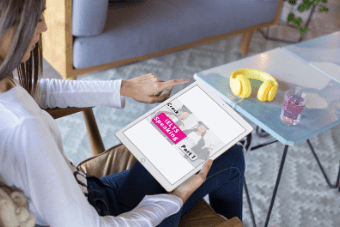
IELTS Speaking topic: Daily routines
Listening Task
1. Watch this person talk about a routine they have
a) What is the main routine?
2. Watch the video above again and note any useful phrases and collocations
Daily routines: Useful phrases
See answers and full script
- I will tell something I do everyday religiously and that is to go for a morning stroll
- Day in, day out (every day without fail)
- Come rain or shine (every day without fail)
- I really feel the benefit(s)
- I typically get up reasonably early
- I get myself a (prepare myself) glass of lemon water
- I put some exercise clothes on – if it’s cold
- Grab my phone and headphones
- I head out (go out and go somewhere)
- As I start walking I will be choosing a podcast I want to listen to
- I pick up the pace (to go more quickly)
- All in all, (overall) it takes anywhere from 40 to 60 minutes
- I do it mainly for health reasons but also to clear my head
- It sets me up for the day (it prepares me for the day ahead)
- Have some ‘me time’ (have time for yourself)
IELTS Speaking: Idioms about daily routines
- As regular as clockwork = very regularly and predictably
I brush my teeth every morning, as regular as clockwork
- As per usual = as always, as usual
My girlfriend is late again, as per usual!
- To be a creature of habit = someone who likes to have the same routine
I hate to miss my early morning walk, I guess you could say I am a creature of habit
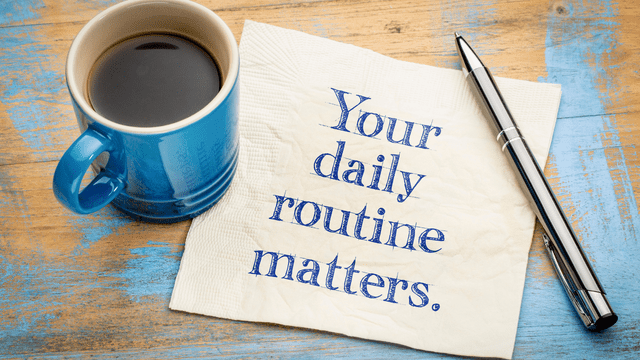
Pronunciation Files For Vocabulary From My Best Live Lessons
Use Words EASILY in English Conversations!
More Free Lessons
If you liked this lesson, leave a comment below!
There are more lessons you can follow in the links below too.
THE ECONOMY in IELTS Speaking. Different economic symbols, idioms, and vocabulary to learn how to talk about the economy.
FEELINGS in IELTS Speaking Vocabulary you need to describe a range of different feelings, as well as talking about topical issues such as mental health.
NEWS in IELTS Speaking Learn vocabulary of national, international and personal news, as well as tips on IELTS Speaking Part 2.
RELATIONSHIP in IELTS Speaking Improve your listening and speaking skills for the topic of relationship.

